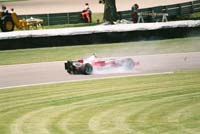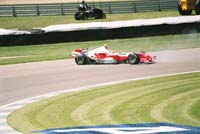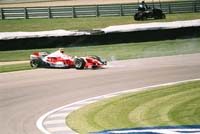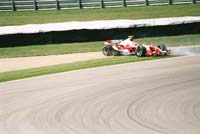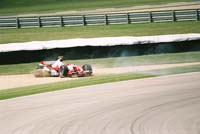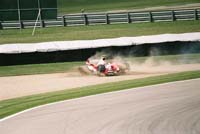


honest_opinion@milesaheadmedia.com
Editoral - 5 September 2005
French Thwarted by Columbia in Another Attempt at World DominationIn the world of Formula 1, the stench of something rotten—is it rotten frommage, perhaps?—has filled the air. And it’s time for the world to sit up and take notice. For centuries, Western civilizations have struggled for world domination. In the new global economy, many may think such dreams are passé, but we say no. The only thing that has changed is the means by which the struggles are won. Whereas the battlefields used to be, well, fields of bloody battle, now those who would seek world glory and power go tête-à-tête with one another economically and in the proxy fields of sport. But what happens when a country...shall we say, perhaps, France?...decides that the rules of battle don’t suit its aims? Without resorting to bullets and bombs, what’s a little country with a big Napoleon complex to do? It seems we have our answer: Manipulate the game, twist the rules, be a spoilsport, until the political, economic, social, and sports' spoils of war can be “won.” Who cares if they are “won” on a corrupted battlefield? The French? No. Not if recent Grand Prix events are any indication. Let’s re-examine the details in a broader context and unveil the recent patterns of French manipulation of the sports world in order to gain greater glory and the greater economic kickbacks that come.
JUNE 2005. USGP. INDY. (INDIANAPOLIS SPEEDWAY—USA) Note the location. It’s important. As early as Friday before the GP, those driving with Michelin tires knew they had a problem. (See photos, above and left: Michelin exec in Toyota pit at at Indy) By Saturday, Zonta, driving his Michelin-shod Toyota, experienced high speed “rapid deflation” in turn five during Saturday practice. (See spectacular series of pics, below.) Any sports team worth its sel might have thought to bring along different tire options, but these guys did not. Call it naïveté or arrogance or just plain bad judgment. Whatever the cause, the decision to commit to just one Michelin design led everyone to come sorely unprepared for the race. The road run is a known variable in the sport. Michelin users came ill equipped to adapt to this variable. It’s like showing up to a hot date without the Viagra when you know you’ve got problems with, er, rapid deflation. The solution? Some would say that in sports contests, the answer is to give it the old college try, race your heart out, stretch your skills, try to win the day, and, if all else fails, accept your losses gracefully. With these teams, however, the only solution to the problem of incompetent planning and under-performing equipment was to ask for a change in the track. Aw, c’mon, the Michelin teams seemed to cry, no fair if you and your equipment are better than we are.
(Above: Zonta's spinout on turn five at Indy) Okay. So there was a problem. Indy supervisors tried to offer a solution, but no responses were acceptable to Michelin teams--other than one that would penalize Bridgestone-shod Ferrari, an Italian team with German and Brazilian drivers; Bridgestone-shod Minardi, another Italian team with Austrian and Dutch drivers; and Bridgestone-shod Jordan, an English team with Indian, Dutch, and Portuguese drivers. Notice the pattern here? The only idea acceptable to the Michelin teams was to slow down all the drivers going into curve 13. It’s pretty clear--as clear as a glass of Perrier: In a sport built on speed, equipment, and skill, teams using French equipment wanted to take a key factor out of the game to increase the chances of a French team or French-tired team of winning the game. Indy supervisors were right to deny this faulty proposal. In response, Michelin execs instructed their teams to hit the road, so to speak, which in this case means they got off it; they boycotted the race. This is the equivalent of a spoiled kid taking his baseball home when he doesn’t get his way. This is a case of sour French grapes, and all those grapes are good for is a good whine. Could it be that the boycotting teams—-who simply were not ready to run—-could not face showing off their incompetence to the entire world? Oui. But our guess is that they saw an added bonus to their decision to cut out of the race. On American soil, they brought down the game, at least momentarily. While billions around the world watched, they tried to make this look like an American embarrassment, and they tried to take down American economic interests in the race. This was a foreign attack on U.S. sovereign soil. Not since 1812 has another country dared such a move. And most U.S. citizens didn’t even know it. But the French need to take notice: The Brits didn’t win the war of 1812, and the French-loyal teams are not going to win this war, either. ITALIAN GP: INDY DEJA VU ALL OVER AGAIN? Reasonable folks might argue that the above tire-rade is a bit over the top, smacking of a faulty conspiracy theory. They might argue this, but the 9/4 Italian GP would show them to be wrong. First, a bit of history on this race. McLaren (an English team with Finnish, Columbian, and Spanish drivers) consistently run heavy on fuel for long first stints. The extra fuel adds weight. We see Kimi in Italy running sufficient fuel to run single-stop race, a decision that means that as the race nears the end, his weight will be relatively light. Sources tell of extensive tests at home in France running rear tires with more load, ostensibly to “predict” extensive wear on rear tires (or to be sure that anyone running heavy would suffer internal damage that would eventually manifest itself later in a race?). The conclusion of these tests? That speaks for itself in the outcome of the race: Tire failure, Kimi!! However, the one factor that could not be calculated on the test rig in France was that never-give-up attitude of a certain Columbian driver. We’re sure they knew Kimi’s reaction would be to change a tire and not risk another spectacular last-lap, high speed exit. However, that wouldn’t stop the Columbian. Nursing a visibly damaged tire to the end, he claimed victory and prevented a Renault one-two finish. Perhaps he sees what so many others seem to be ignoring. And so now there’s a push for the whole fleet of racers to operate with just one brand of tire. Which will it be? Japanese Bridgestone tires or French Michelin? Isn’t it a bit of coincidence that, should the fleet go with Michelin, French-sounding and partly French-government-owned manufacturer Renault would have a distinct advantage over the competition? This liaison is dangerous not just to the competition, but also to sports and to the broader world alike. If this sounds a little familiar, even to non-F1 aficionados, it’s because the French twist on sportsmanship extends beyond Formula 1. Wasn’t there something about, oh, corrupt French judges in the 2002 Winter Olympics? And now, after a highly distinguished cycling career, in which he left fellow racers in the French provincial dust year after year, American Lance Armstrong faces nasty, uncorroborated insinuations, courtesy of the French press. Enough is enough. A deep look at this will show remarkable similarity to Germany in the late 1930s. Don’t laugh. If the goal is total world domination, then the means is to control the masses. What better way to impress the masses than to make your conquests in the seemingly harmless, seemingly level playing field of sports? But when money and power come as a result of rigged rules, democracy’s ideals are themselves attacked. Good, honest Michelin teams need to act now: Defect to Bridgestone en masse. Leave the French and their Spanish and Italian collaborators with them. Let them retreat with their tails between their frog's legs. Vive le competition! As long as it’s free and fair. --THE EDITORS AT milesaheadmedia.com P.S. Stay tuned to Honest Opinion as more info is uncovered in this nefarious plot. P.P.S. Honest Opinion welcomes comments. Send yours to honest_opinion@milesaheadmedia.com and we may publish it on-line. (We reserve the right to edit for flow and length.)

